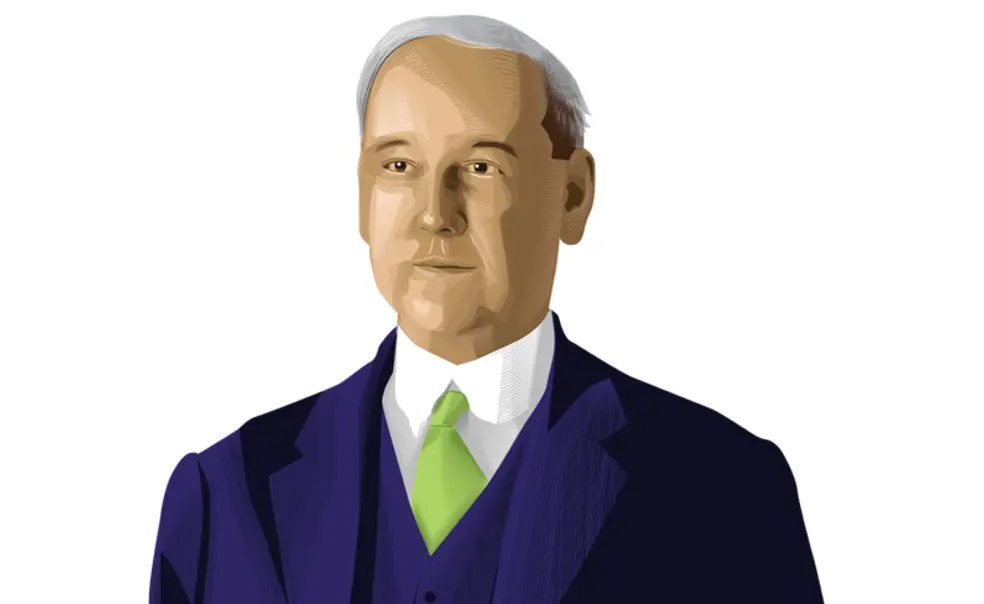A World Traveler, He Was Among the First International Reporters
Herbert Adams Gibbons *1914
Any writer will tell you that writing is one of the most challenging of professional vocations. But Herbert Adams Gibbons *1914, a prolific international correspondent active in the years before and after World War I, thought otherwise. “No career offers greater possibilities for service and richer reward than that of the writer,” Gibbons argued in a 1923 article in The Daily Princetonian. “It is the one profession in which a man can support himself while learning his trade. It is not overcrowded, and recognition is likely to come early.”
Success came early for Gibbons, a gallivanting geopolitical pundit whose work anticipated the wide-ranging interests of modern reporters such as Ben Taub ’14 of The New Yorker and Thomas Friedman of The New York Times. According to his 1934 obituary in the Times, “The name of Herbert Adams Gibbons is associated with the remapping of the world — not as a geographer but as a reporter to his own continent of changed conditions in the four other continents and of our place among them.”
Gibbons was born in 1880 in Annapolis, Maryland, and attended the University of Pennsylvania before pursuing a master’s in history at Princeton and a divinity degree at Princeton Theological Seminary; he received a Ph.D. from the University in 1914. Said to be an imposing figure at 6-foot-2 and 240 pounds, he and his wife, Helen Davenport Gibbons, pursued missionary work in Tarsus, a city on the south coast of Anatolia (present-day Turkey).
In 1909, they witnessed a massacre of Armenians in the nearby city of Adana, a riot-turned-pogrom in which more than 20,000 people died, before the Armenian genocide during World War I. At the time of the incident, Herbert and Helen sheltered some 3,000 Armenians within the walls of their mission. Their experiences were widely publicized and later chronicled in two memoirs, one written by Herbert, another by Helen, bringing attention to the persecution of Armenians in the Ottoman Empire.
“The reporter enjoys advantages, denied to the historians of to-morrow [sic]. He has come into close personal contact with makers of history at the moment the history was made.”
Herbert Adams Gibbons *1907
After being a part of the news, Gibbons started writing it, becoming a nationally syndicated correspondent reporting from such locales as Egypt, Turkey, and the Balkans. And yet, Gibbons could not remain on the sidelines. During World War I, he enlisted in the American Expeditionary Forces and received the Legion of Honor medal from France before joining the Princeton history department.
Over the course of his career, Gibbons wrote 28 books on nearly every aspect of international relations. His writings encompassed a controversial, and often conflicting, range of opinions. Though he was a staunch supporter of Woodrow Wilson 1879’s Fourteen Points, including each nationality’s right to self-determination, Gibbons also defended colonialism. He opposed the independence of the Philippines from the U.S. and failed to condemn the Japanese occupation of Manchuria.
Despite the inconsistency of his positions, Gibbons’ credibility rested on having firsthand experience. In 1931, he claimed to have been the first person to cross Africa by rail, thanks in part to being the first passenger on a railroad that connected colonial Angola to what is now the Democratic Republic of the Congo.
Still, Gibbons was hardly an objective writer. His 1920 biography of Greek politician Eleftherios Venizelos compared his subject to Lincoln, Garibaldi, Moses, and the “messiah.” “This, however, is a venial fault which few enthusiastic biographers escape and which does not detract from the general fairness and restraint which pervade the book,” American diplomat Joseph C. Green 1908 wrote in a 1921 PAW review.
Gibbons recognized that he was writing the first draft of history and celebrated being close to the action. “The reporter (for this is what the writer on contemporary events really is) enjoys advantages, denied to the historians of to-morrow [sic],” Gibbons wrote. “He has come into close personal contact with makers of history at the moment the history was made.”












No responses yet